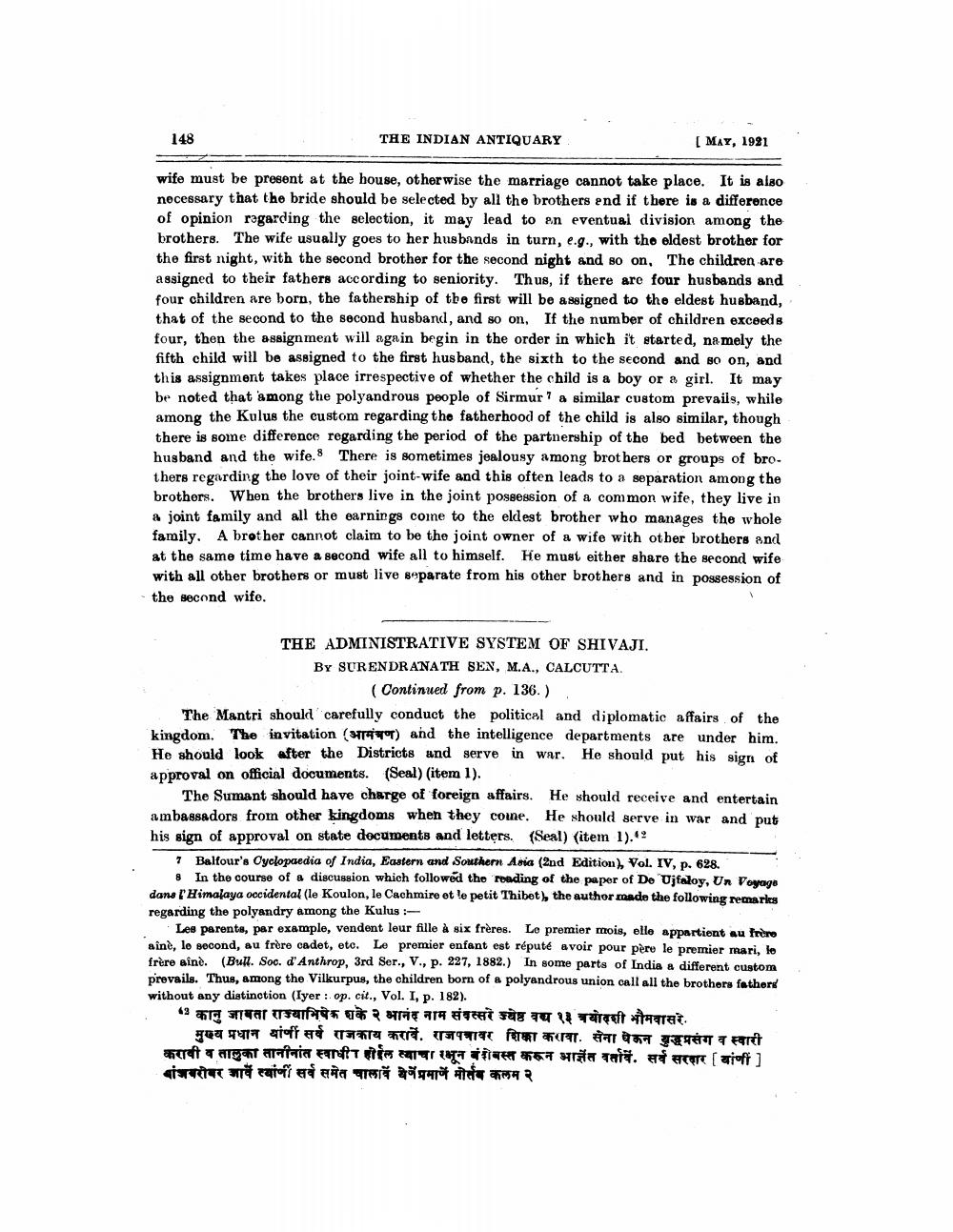________________
148
THE INDIAN ANTIQUARY
[ MAY, 1931
wife must be present at the house, otherwise the marriage cannot take place. It is also necessary that the bride should be selected by all the brothers end if there is a difference of opinion ragarding the selection, it may lead to an eventuai division among the brothers. The wife usually goes to her husbands in turn, e.g., with the eldest brother for the first night, with the second brother for the second night and so on. The children are assigned to their fathers according to seniority. Thus, if there are four husbands and four children are born, the fathership of the first will be assigned to the eldest husband, that of the second to the second husband, and so on. If the number of children exceeds four, then the assignment will again begin in the order in which it started, namely the fifth child will be assigned to the first husband, the sixth to the second and so on, and this assignment takes place irrespective of whether the child is a boy or a girl. It may be noted that among the polyandrous people of Sirmur? a similar custom prevails, while among the Kulus the custom regarding the fatherhood of the child is also similar, though there is some difference regarding the period of the partnership of the bed between the husband and the wife. There is sometimes jealousy among brothers or groups of brothers regarding the love of their joint-wife and this often leads to a separation among the brothers. When the brothers live in the joint possession of a common wife, they live in a joint family and all the earnings come to the eldest brother who manages the whole family. A brother cannot claim to be the joint owner of a wife with other brothers and at the same time have a second wife all to himself. He must either share the second wife with all other brothers or must live separate from his other brothers and in possession of - the second wife.
THE ADMINISTRATIVE SYSTEM OF SHIVAJI. BY SURENDRANATH SEN, M.A., CALCUTTA.
(Continued from p. 136.) The Mantri should carefully conduct the political and diplomatic affairs of the kingdom. The invitation (AYT) and the intelligence departments are under him. He should look after the Districts and serve in war. He should put his sign of approval on official documents. (Seal) (item 1).
The Sumant should have charge of foreign affairs. He should receive and entertain ambassadors from other kingdoms when they coine. He should serve in war and put his sign of approval on state documents and letters. (Seal) (item 1).
7 Balfour's Cyclopaedia of India, Eastern and Southern Asia (2nd Edition, Vol. IV, p. 628.
8 In the course of a discussion which followed the reading of the paper of De Ujfaloy, Un Voyage dans Himalaya occidental (le Koulon, le Cachmire et le petit Thibet), the author made the following remarks regarding the polyandry among the Kulus :
Les parents, par example, vendent leur fille à six frères. Le premier mois, elle appartient au frère aîne, lo second, au frère cadet, etc. Le premier enfant est réputé avoir pour pere le premier mari, lo frère aind. (Bull. Soc. d'Anthrop, 3rd Ser., V., p. 227, 1882.) In some parts of India a different custom prevails. Thus, among the Vilkurpus, the children born of a polyandrous union call all the brothors fathers without any distinction (Iyer : op. cit., Vol. I, p. 182).
कान जाबता राज्याभिषेक शके २भानंद नाम संवत्सरे ज्येष्ठ वय १५ पयोदशी भौमवासरे,
मुख्य प्रधान यांनी सर्व राजकाय करावे. राजपत्रावर शिक्का करावा. सेना घेऊन युप्रसंग व स्वारी करावी व तालुका तानीनांत स्वाधीश होईल त्याचा रभून बंशेबस्त करून भार्जेत वावें. सर्व सरकार [बांणी ] बांजबरोबर जावे त्यांनी सर्व समेत चालावें वेजेंप्रमाणे मोर्तब कलम २




